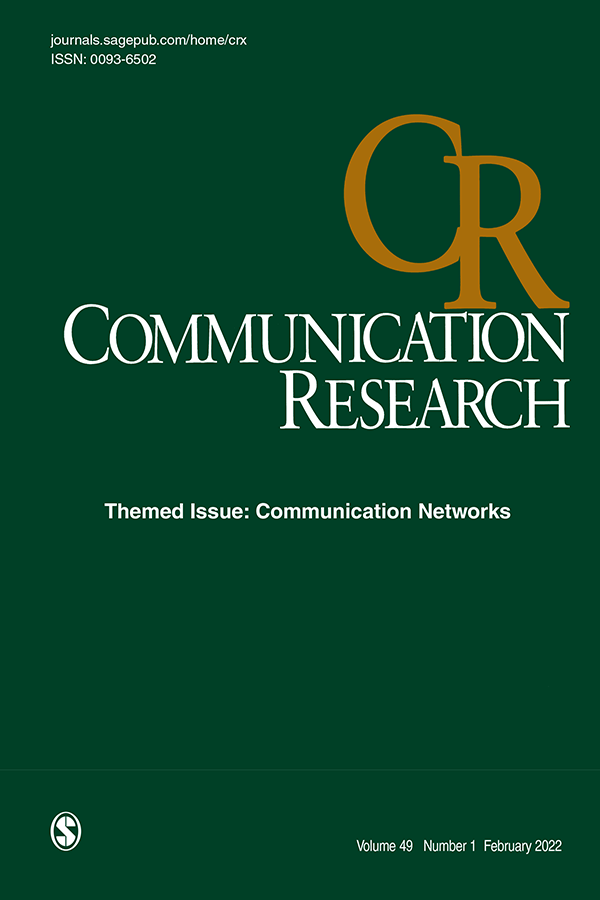Moral Balancing in Video Games: The Moderating Role of Issue Congruency
IF 3.2
1区 文学
Q1 COMMUNICATION
引用次数: 0
Abstract
Research has shown that performing moral or immoral actions in video games can affect the players’ moral self-worth and evoke moral emotions. People may compensate for their immoral behaviors by performing more moral actions, but sometimes performing moral actions can also license them to perform immoral behaviors later. The current study examines whether players engage in moral licensing or moral cleansing behaviors within and after video game moral scenarios. Study 1 is an exploratory study that examined a sequence of moral dilemmas in the game Papers, Please, and found that players alternated between choosing the moral choices and the accurate choices, indicating signs of moral balancing when faced with moral choices that conflict with their in-game goals. Study 2 utilized a 3 (moral vs. immoral vs. control) × 2 (congruent charity vs. incongruent charity) experiment using a moral event in the game Life is Strange to examine the moderating effects of issue congruency on moral balancing. Study 3 used three different games to replicate Study 2. The findings showed that players who performed moral actions in the game also devoted more efforts to a charity on a congruent issue. However, participants who performed a moral behavior in the game committed significantly less effort to a charity on an incongruent issue, indicating a moral licensing effect. Study 2 found that performing immoral actions in a game can motivate players to devote more efforts to a subsequent charity, regardless of issue congruity, but this moral cleansing effect was not observed in Study 3.电子游戏中的道德平衡:问题一致性的调节作用
研究表明,在电子游戏中进行道德或不道德的行为会影响玩家的道德自我价值,唤起道德情感。人们可以通过采取更多的道德行为来补偿他们的不道德行为,但有时采取道德行为也可以允许他们以后采取不道德行为。目前的研究考察了玩家在电子游戏道德场景内外是否参与道德许可或道德净化行为。研究1是一项探索性研究,研究了游戏《Papers,Please》中的一系列道德困境,发现玩家在选择道德选择和准确选择之间交替,表明当面临与游戏目标相冲突的道德选择时,有道德平衡的迹象。研究2使用了3(道德与不道德与控制) × 2(一致慈善与不一致慈善)实验使用游戏《生活很奇怪》中的道德事件来检验问题一致性对道德平衡的调节作用。研究3使用了三种不同的游戏来复制研究2。研究结果表明,在游戏中做出道德行为的玩家也会在一个一致的问题上为慈善机构付出更多的努力。然而,在游戏中表现出道德行为的参与者在不协调的问题上对慈善机构的投入明显减少,这表明了道德许可效应。研究2发现,无论问题的一致性如何,在游戏中做出不道德的行为都可以激励玩家为随后的慈善事业付出更多的努力,但在研究3中没有观察到这种道德净化效果。
本文章由计算机程序翻译,如有差异,请以英文原文为准。
求助全文
约1分钟内获得全文
求助全文
来源期刊

Communication Research
COMMUNICATION-
CiteScore
17.10
自引率
0.00%
发文量
20
期刊介绍:
Empirical research in communication began in the 20th century, and there are more researchers pursuing answers to communication questions today than at any other time. The editorial goal of Communication Research is to offer a special opportunity for reflection and change in the new millennium. To qualify for publication, research should, first, be explicitly tied to some form of communication; second, be theoretically driven with results that inform theory; third, use the most rigorous empirical methods; and fourth, be directly linked to the most important problems and issues facing humankind. Critieria do not privilege any particular context; indeed, we believe that the key problems facing humankind occur in close relationships, groups, organiations, and cultures.
 求助内容:
求助内容: 应助结果提醒方式:
应助结果提醒方式:


